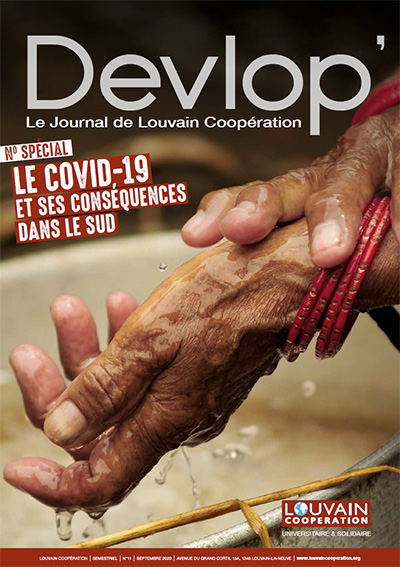

Edito
We will not give up!
When the transmission methods of this ‘damned’ Covid-19 virus became better known in mid-March, we were very concerned. We feared the damage that this disease would cause in the countries where we operate, in the South, where human contact is usually closer and where the health and social protection systems are significantly less effective than in our Western countries.
We inevitably thought about the human catastrophe that this pandemic could cause... What effective and useful measures could be taken to enable people in the Global South to protect themselves individually and collectively from what was likely to be widespread infection? In consultation with our partners, our teams quickly devised and implemented measures to prevent and treat the disease: first in Burundi, then in Benin and Togo, followed by Bolivia, the DRC, Cambodia and Madagascar – in short, everywhere we carry out health-related activities.
We quickly sent out messages in local languages about preventive measures, provided medical equipment and supplies to the health facilities we support, and supported and trained healthcare workers who, like their counterparts in Belgium, were becoming increasingly overwhelmed and stressed by this unprecedented health crisis. As you will understand as you read this magazine, we know that a socio-economic impact with serious consequences awaits us all, in both the North and the South. We will not give up and will remain alongside our partners to get through this unprecedented global health crisis together, trying to limit the damage and human losses as much as possible...
Sophie Wyseur
Head of Operations
The situation
On 16 March, the first case of Covid-19 was reported in Benin. Farmers' families were quickly affected by the containment measures, as it became difficult to go to the various urban markets in Cotonou to sell their produce. Supplies of certain foodstuffs were also made more difficult by the closure of borders. In the Atacora region, fonio sales have been particularly poor. Stocks are therefore high, and the arrival of the rainy season is likely to damage them. In the south of the country, cassava processing cooperatives are facing a shortage of raw materials. In addition to the poor harvest in 2019, there are the restrictions imposed by Covid-19. Their members are therefore having to use part of their financial reserves to feed their families. In addition, field work has fallen behind schedule, and the slowdown in agricultural and economic activities could lead to a fall in household purchasing power.
OUR ACTIONS
Our Beninese health mutuals have distributed a number of messages and prevention materials against the virus. Fonio processors will receive support to sell their stocks, as will cassava processors to improve access to the raw material.
.THE SITUATION
Bolivia declared a total quarantine and closed its borders at the end of March. Despite this, Covid-19 has gained ground and the health system, already failing, cannot cope with the influx of patients. Patients are being sorted out in the streets and there is a shortage of equipment and medicines to treat them in the health centres. Medical staff are highly exposed and lack protection. From an economic point of view, the small businesses we are supporting are suffering particularly badly, as this situation is preventing them from selling their produce.
OUR ACTIONS
We inform the beneficiaries of our projects about preventive health measures, but also to limit cases of intra-family violence in confinement conditions. We are also attentive to the opportunities available in each municipality to support production units.
The situation
Cambodia has been spared the brunt of the virus in our various areas of operation. In mid-March, the Cambodian government took strict measures to avoid population movements. Today, the kingdom remains one of the few countries not to have suffered any casualties. On the socio-economic front, however, there are major concerns, with the crisis affecting three of the country's economic engines: tourism, manufactured exports and foreign direct investment. These engines account for 70% of the country's growth and 40% of its paid employment. According to a recent World Bank report, the slowdown could lead to an increase in poverty estimated at between 3% and 11%. Families who depended on income sent back by their members who left to work in Thailand (90,000 migrant workers have returned since March 2020) now find themselves in a particularly precarious situation.
Our actions
The health crisis and its socio-economic impact have led to an increase in mental health problems and, here again, the poorest populations are the most affected. Faced with this situation, our local partners have adapted their actions. Psychological support units have been set up, with a 7/7 telephone helpline for patients and their families, as well as for nursing staff.
As for social workers, they have promoted prevention and awareness-raising initiatives linked to Covid-19.
THE SITUATION
The DRC announced a state of emergency on 25 March, involving numerous confinement measures. These measures have led to a scarcity of essential manufactured goods (which are usually imported), but also to soaring prices for local products, particularly agricultural produce, which has doubled in price. The suspension of a large proportion of economic activities has led to the loss of many jobs (both formal and informal). Many families are suffering from hunger, and there is a risk that the number of children left on the streets will soar. In terms of health, it is difficult to treat the sick, and nursing staff have very few means of protection. Fortunately, so far the epidemic does not seem to be claiming many victims. As a result, containment measures have been relaxed over the summer.
OUR ACTIONS
We started by dealing with the most urgent issues: equipping hospitals and raising public awareness. At the beginning of April, we organised a fund-raising event that attracted a great deal of generosity. As a result, we were able to finance the purchase of masks, gloves, disinfectants and respirators for our partner hospitals. Major awareness-raising campaigns on the dangers of Covid-19 and protective measures were also organised by our teams and partners.
THE SITUATION
The ‘big island’ closed its borders on 19 March and a state of health emergency was declared two days later. The confinement and restrictions on movement between the different regions of the country are severely hampering commercial and economic activities, and the people who make their living from selling their agricultural or fishing produce are particularly hard hit by this market paralysis. The families of groundnut growers that we support are particularly hard hit. The impossibility of selling their produce outside the region has caused prices to fall by almost 40%, and producers are forced to sell because they have neither the cash nor the infrastructure to allow them to store their produce speculatively. To compensate for this low selling price, most growers have sold their entire production (already reduced by the lack of rain), which will limit the quantity of seed available for the following season. In terms of health, the training of health staff is insufficient to deal with the crisis, as is the material and equipment required to protect themselves and patients.
OUR ACTIONS
Thanks to the generosity of our donors, we have been able to further equip our healthcare partners to better welcome, raise awareness and care for patients. The families of farmers who make a living from selling groundnuts receive productive seeds so that they can sow their fields quickly. We are also providing them with cereal and pulse seeds to supplement their production, as well as small equipment and materials to make field work easier.
Philippe De Leener is a professor at the Centre for Development Studies at UCLouvain, specialising in economics, political science and the sociology of change in the context of sub-Saharan Africa. He is also Chairman of Inter-Mondes and Co-Chairman of the social economy federation SAW-B asbl (Solidarité des alternatives wallonnes et bruxelloises). He answers Devlop's questions.
LC: How do you see the Covid-19 crisis?
Philippe De Leener: I think it's important, first and foremost, to place the current crisis in a broader context: the pandemic is the signature of an impasse affecting the global economy. Covid represents one of the first contemporary manifestations of a much deeper crisis: that of capitalist systems of accumulation. If we do not analyse the pandemic in this context, we cannot understand it.
Download the PDF (footer) to read the rest of the interview

